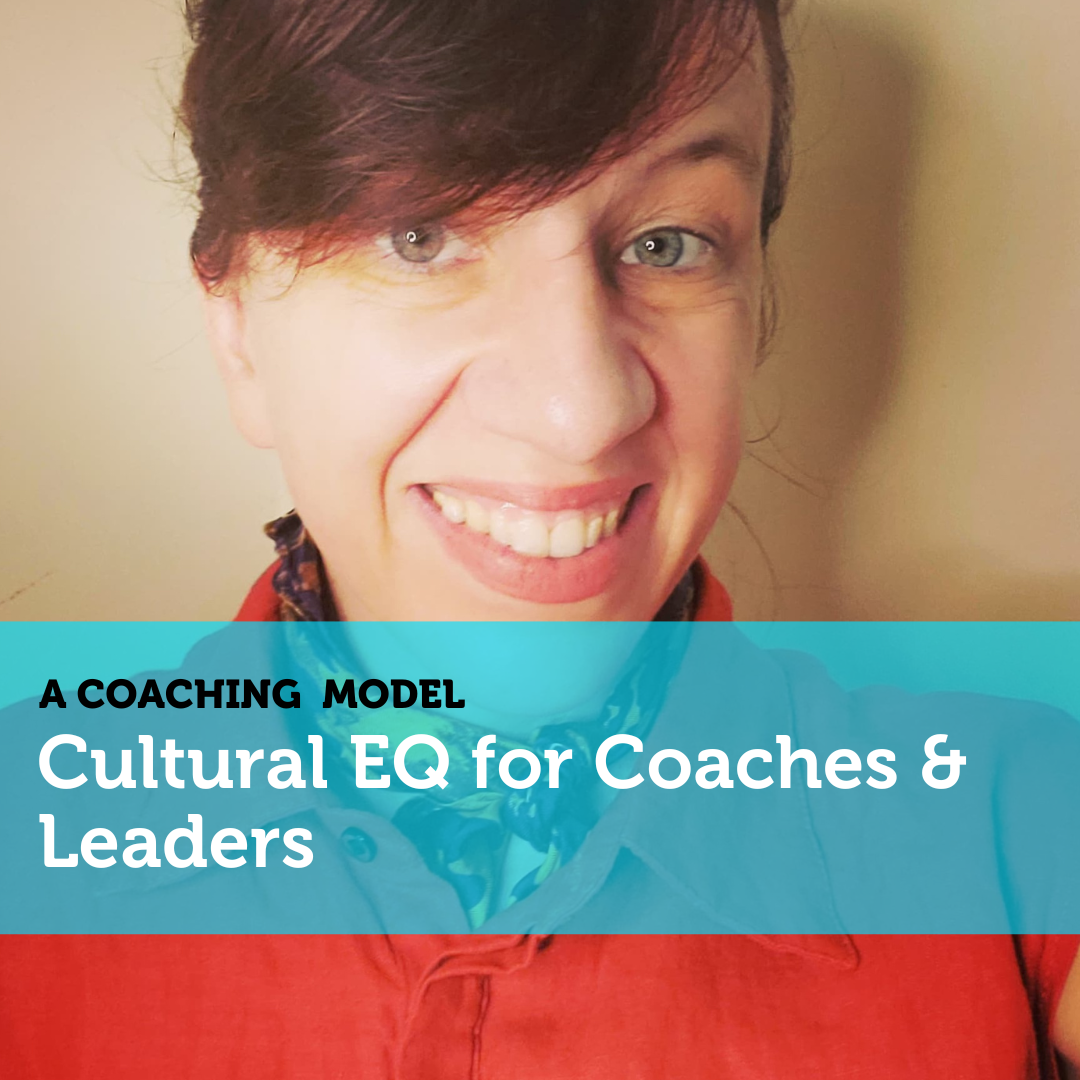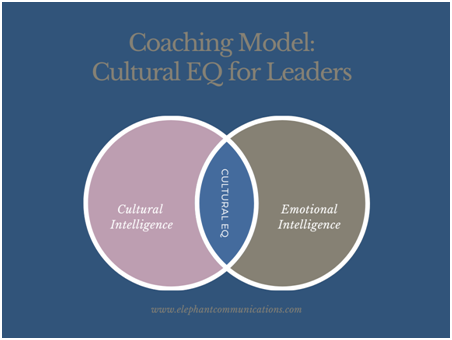A Coaching Model By Michelle Bradley, Leadership Coach, TAIWAN
Cultural EQ for Coaches & Leaders Coaching Model
When working with a client, it is essential for us as coaches to have an understanding of their underlying beliefs as well as expectations. As these are often culturally embedded, a coach working across cultures needs both Cultural and Emotional Intelligence (CQ & EQ) in order to identify, understand, and openly discuss them in a coaching session.
So the question is, how can we develop ourselves as coaches to increase both our CQ & EQ? I believe that as leadership coaches working with global teams, it is essential to blend both one’s CQ & EQ development, and have therefore created the following coaching model: Cultural EQ for Global Communication.
Emotional intelligence skills are critical for building relationships and teams, resolving conflict, solving problems, leading effectively, and building resilience. As Cultural Intelligence is related to Emotional Intelligence, working on them together is a perfect way to develop the confidence and know-how to coach effectively across cultures.
Coaches with high EQ are sensitive to people’s feelings and needs and understand how their own emotions and behavior impact those around them. But they need additional skills if they’re to understand the cultural factors at play and adapt their own communication skills accordingly.
By developing one’s EQ & CQ, a coach will be more aware of the values, beliefs, and attitudes of people from different cultures, and will have the skills to respond with informed empathy, genuine understanding, and impact.
Cultural Intelligence:
Cultural Intelligence is the ability to adapt to new cultural settings. Cultural Intelligence is also known as Cultural Quotient (CQ), which is derived from IQ. People with high CQ aren’t experts in every kind of culture. Rather, they have the skills to go into new environments with confidence, and to make informed judgments based on their observations.
People with high CQ excel at understanding unfamiliar or ambiguous behavior. They are able to identify shared influences among groups, and this allows them to identify the impact of a particular culture which is essential in today’s global environment.
However, they also know that cultural influences are complex and interconnected. They understand that while culture is important, factors such as professional roles, generational differences, and individual personalities also have a powerful effect on behavior, too.
What Are the Advantages of Developing Cultural Intelligence?
Developing your Cultural Intelligence helps you to work effectively as a coach with anyone who’s different from you. When working with clients on a global scale, CQ can prevent you from making cultural errors that can cause confusion and embarrassment, or potentially undermine your client’s progress.
CQ can also give you insights into the culture of every individual or organization that you work with. The more you understand their values, the better you’ll be at playing by their cultural ‘rules’ and adjusting your own.
Emotional Intelligence:
Emotional intelligence skills are critical for developing empathy, intuition, and relationships; as well as resolving conflict, solving problems, and building resilience.
The Cultural EQ Model
Paired with a global mindset and empathy, cultural differences can serve as a strength for coaches working across cultures. This model accompanies you (or your organization) on the journey toward successful global communication.
It can help achieve powerful, sustainable results around topics such as:
- Increasing self-awareness, including values, strengths, and blind spots
- Remaining calm, centered, and grounded
- Increasing your cultural intelligence and ability to communicate effectively across cultures and generations
- Developing emotional intelligence leads to improved coaching performance and life balance
- Deepening presence and positively influencing others
Useful Questions to Ask Yourself:
Two questions that are very helpful to start off with revolve around strategy & action in Cultural Intelligence:
- Can you plan for differences before interacting with a client from a different corporate, national, or generational culture? (this is connected to CQ Strategy)
- What’s your level of flexibility when encountering cultural behaviors and preferences of these teams, leaders, or organizations? (this is connected to CQ Action)
Example: Orientation vs. Ability
Developing Cultural EQ can also help a coach to accurately interpret behavior. One essential skill needed to do this is leveraging one’s insight into our clients’ Orientation vs Ability:
- Orientation: what you prefer
- Ability: what you are capable of
- Behavior: what you do in reality
Case Study
For example, let’s take a look at Sara based in (and from) Taipei who leads a global team consisting of members from Europe, the US, and the APAC region.
She finds it challenging to give critical feedback, as well as to actively engage in and encourage healthy debate. In her own words, she told me that she isn’t ‘good’ at these skills and needs to improve them, especially when using English.
In our coaching sessions, we’ve explored this topic in more depth and I’ve worked with her on differentiating between the concepts of her behavior, orientation, and ability.
Sara originally decided her problem was an issue of her ability. However, after further exploration of intercultural concepts, she started to realize that her cultural preference for harmony and internal cooperation resulted in her leadership habit of always avoiding any sign of conflict in order to ensure that everyone saves face. The other side of this tendency is that she avoids certain conversations due to a fear of someone’s feelings being hurt, hence her lack of practice in giving critical feedback.
Once she realized her orientation, it helped her immensely to break free from her self-imposed view of her ability. We’re now working on developing her own synthesized approach to feedback and addressing issues that include both harmony and directness. This will lead to higher fulfillment and performance for herself and her team – I’m excited!
As a leader, mentor, or coach, learning to identify if a specific behavior of either yourself or a team member is due to orientation or ability will have a massive impact on the effectiveness of the approach you take to address it. For example, will you choose to re-evaluate a (potentially self-limiting) belief or increase a certain skill level?
Cultural EQ Benefits
When you approach intercultural communication in this manner, you’re actually engaging in Cultural Intelligence competencies whilst strengthening your Emotional Intelligence through self-awareness, reflection, and empathy.
Having the ability to recognize Cultural Orientation vs Ability is one example of the importance of developing Cultural EQ for coaches (as well as leaders).
Overall, in our global world with many of our coaching sessions taking place in our virtual world of today, many coaches communicate across cultures daily. They may not need to immerse themselves in their host country’s culture (as they could still be in their living rooms at home), however, developing Cultural EQ is still of vital importance in order to ensure successful communication and results.
Learn How to Create Your Own Coaching Model
Your Coaching Model reflects your values,
philosophies, and beliefs and must communicate who you will coach
and the problems you will solve. Read more about creating your coaching model
References
Books:
Digital, Diverse & Divided: How to Talk to Racists, Compete With Robots, and Overcome Polarization By David Livermore
Coaching Across Cultures: New Tools for Leveraging National, Corporate and Professional Differences by Philipe Rosinski
Website:
Elephant Communications www.elephantcommunications.com/

